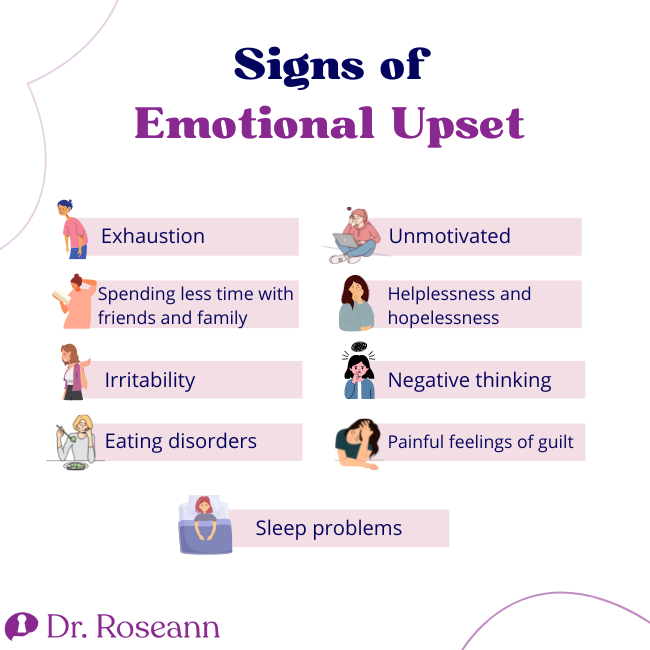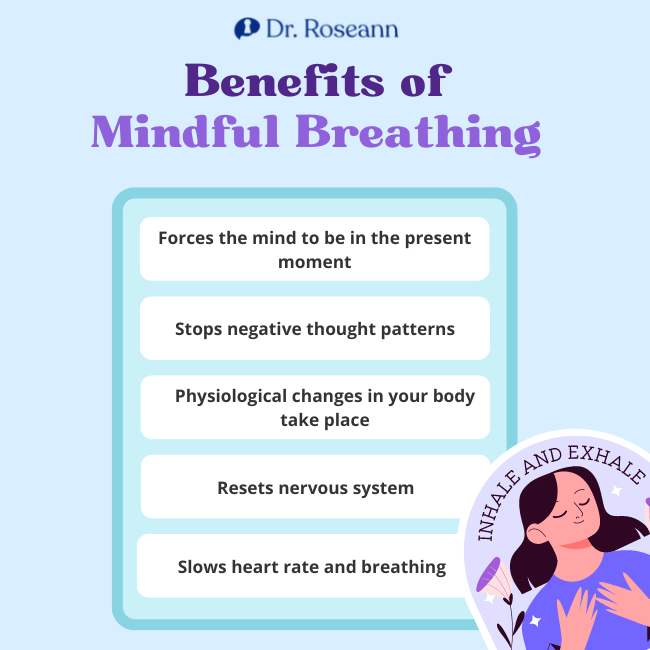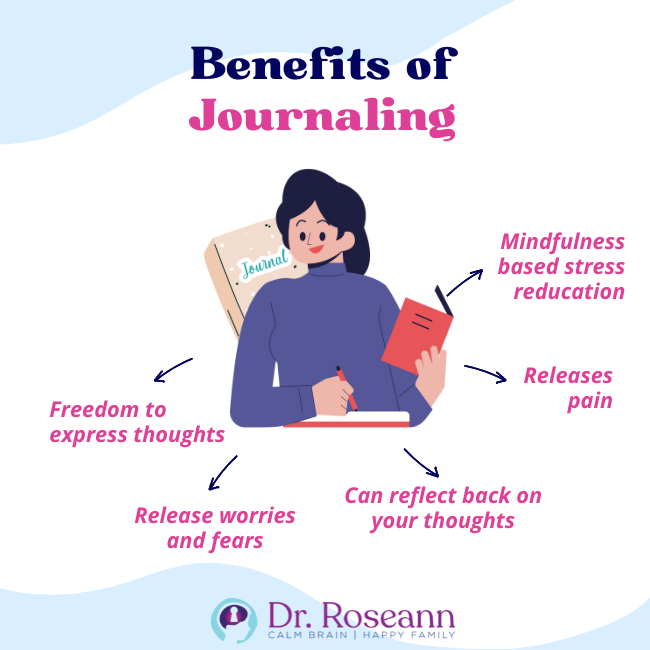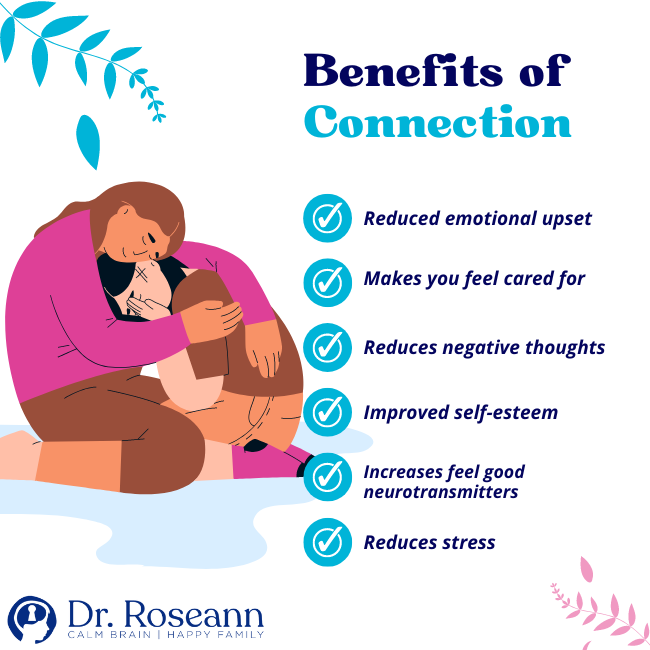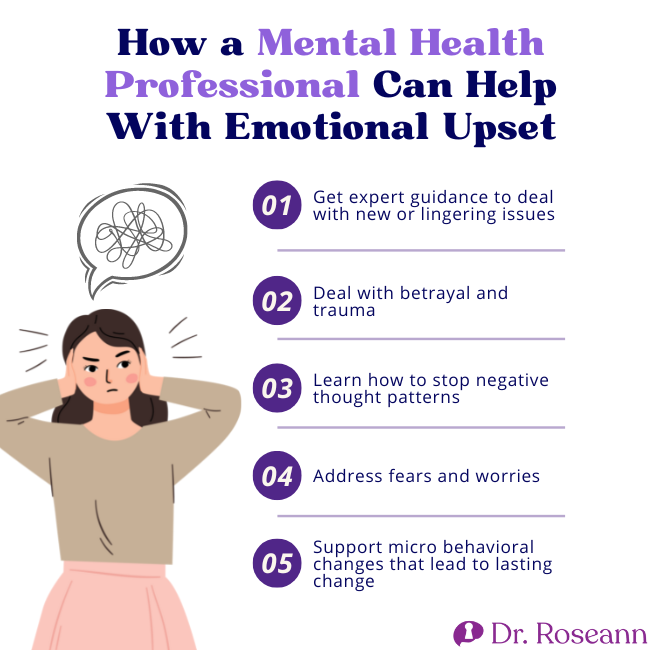It is painful to experience difficult emotions. It is common for people to encounter emotional distress as a result of stress, upset, disappointment, traumatic events, loss, grief, and toxic relationships. Any bad experience or extreme emotional pain affects a person's mind and body, especially when we don't address the pain. Suppressed emotional pain affects your physical and mental health and can be easily re-triggered.
Emotional pain can stem from life's ups and downs. In some cases, other people's actions can cause one's emotional pain. On the other hand, it may be due to ongoing ADHD, anxiety, depression, OCD, or other clinical conditions.
Your thoughts can also trigger these emotions. Whether it is a runaway, looping thought, or negative thinking pattern, one's mental processes directly influence emotions.
Signs of Emotional Pain
You may be suffering from emotional pain without realizing it because emotions can creep in and affect your brain and body without making the connection to a prior event. The following physical symptoms may indicate that you're dealing with this issue:
- Exhaustion
- Spending less time with friends and family
- Irritability
- Eating disorders
- Unmotivated
- Helplessness and hopelessness
- Negative thinking
- Painful feelings of guilt
- Sleep problems
But it won't matter what caused the pain, as emotional pain will affect every aspect of your life to some degree. Some people are more functional in their daily life, but emotional pain always impacts you on the inside.
So learning how to deal with it healthily is crucial. Never resort to using unhealthy coping mechanisms to overcome emotional pain. Healing takes time, so be patient with yourself. In time and with self-care, you can address the upset.
10 Ways to Deal with Emotional Pain
Here are some helpful ways to counter any feelings of emotional pain and replace them with positive emotions and healthy thinking instead. There are many ways to improve your mood and mindset, requiring micro steps integrated into your lifestyle to get started. This guide can help you put a break to your emotional reactions and give you a sense of emotional balance in your life.
#1 Practice mindfulness
Focusing on the present moment reduces your reliance on the past. You'll have more freedom to choose how to respond to emotional pain when you practice being present instead of being ruled by your past hurts.
Children can quickly learn mindful breathing. Practicing mindfulness breathing involves focusing on your breathing from inhalation to exhalation. The purpose of mindful breathing is to observe how you breathe rather than to control or change it. Being mindful of how you breathe encourages the body to breathe more gently and slowly.
Focusing on your breath forces the mind to stay in the present moment. You can feel the results of mindful breathing immediately as the physiological changes in your body take place. It resets the nervous system and slows a person's heart rate and breathing.
Children will start to feel calm and relaxed and realize they can control their strong emotions. Focusing on one's breathing can help children ground themselves and focus on their bodies. It is a great way to teach them how to calm themselves down amidst a difficult situation.
#2 Exercise
You may not even want to get up when experiencing psychological pain. Doing this can lead to greater depression and feelings of desolation. It's better to move your body and engage in any physical exercise. Walk around the block. Get up and stretch. Even the simplest body movements can help.
You can release emotional pain from your body by doing any physical activity. Moving can lift your spirit and boost your energy when you're down. Additionally, it can help you mobilize your nervous system. Aerobic exercises such as jogging, cycling, swimming, walking, dancing, and gardening can help reduce depression and anxiety disorders (Guszkowska, 2004).
#3 Turn to a hobby or volunteer
If you want to overcome emotional pain, obstacles, and challenges, try to do something future-oriented and productive. Do something you enjoy, start a new hobby, or focus on social endeavors. Positive distractions can help you relax and connect with yourself or others For example, you can try weight training or rock climbing to counter negative memories.
Meanwhile, volunteering gives you a sense of purpose and boosts your self-confidence. It can also be used to cope with emotional pain by getting you to focus on the needs of others. By volunteering, you will learn new skills, strengthen community ties, gain experiences, and meet more people. So, engage in more social activities that you enjoy.
Giving can also boost your mental, physical, and emotional well-being. Volunteering has many benefits and only requires a short-term commitment or a little of your time. The benefits of volunteering go beyond helping others in need.
#4 Start a journal
If something happens to you, put it in a journal. Add a comment about how you felt about it. Writing gives you the freedom to express your emotions by writing them down. You can write anything you want without anyone interrupting or criticizing you.
Emotions are a part of who you are. Writing about your emotions will help you reflect, analyze, and change them, which will help you overcome emotional pain. It's like talking to yourself to help reinforce your convictions. It also keeps you from ruminating because it is a mindfulness-based stress reduction activity that helps take you out of your looping thoughts.
#5 Engage in self-care
In times of emotional pain, it feels like nothing but hurt all around us. With self-care, you set boundaries, say no, do what makes you happy, choose to be comfortable, and prioritize your needs. The mere act of enjoying a funny movie can be a form of self-care.
Taking care of yourself every day will empower you in the long run. As a result, your pain won't feel as overwhelming. In addition, research has identified emotional self-care as a crucial component of symptom management (Sebastian et al., 2022).
#6 Make lifestyle changes
Lifestyle changes refer to shifting your life's core habits to improve physical and psychological health. It's a concept generally consisting of practices encouraging balanced eating, active living, weight management, and emotional regulation.
Some activities that can initiate lifestyle changes include yoga, meditation, dancing, aromatherapy, aerobics, and more. Work closely with experts in each field, such as behavioral therapists, dieticians, and fitness coaches, for guidance.
#7 Practice gratitude
Make a list of everything positive and good. Take note of everything and reflect on it. Gratitude can help you gain a different perspective. Your intention here is not to ignore negative emotions because it is necessary to feel or experience them too. The idea is to recognize the good things you have at the moment.
And children are never too young to start an attitude of gratitude. Modeling gratitude language at home is how to start. It helps children to understand that even when things feel “icky” in life, being grateful can reset us and lead us to solutions instead of being stuck.
People tend to focus on what's wrong around them and miss everything right. Write one thing you're grateful for in a notebook or journal and return to it every time you feel emotional pain. It will help you look past your sorrow and has been clinically proven to combat anxiety and depression.
#8 Get support from family and friends
A healthy way to deal with emotional pain is to get support from people who love you. Neither life nor your hurts should be handled alone, so a support group would greatly help. The support of your old friends and family member can limit isolation and force us to remember the good things around us.
Good relationships with family members lead to healthier behaviors, improved self-esteem, and better coping with stress (Thomas et al., 2017). Socializing and being part of a community makes us feel accepted and heard and leads to an increase in feel-good neurotransmitters.
#9 Forgive
Allow yourself to forgive yourself or others when you feel upset or stuck. Waiting for an apology from the other person may significantly delay letting go of issues holding you back. Forgiveness is the first step to healing. It lets go of guilt, anger, shame, and sadness. To recover from hurt and pain, you must initiate the healing process, which may mean accepting the person who hurt you won't apologize.
#10 Laugh
Humor reduces emotional pain by shifting how we feel, think, and create bonds with others. Humor can reduce one's emotional distress. Laughter expresses exhilaration and serves other functions related to relationships and self-regulation. Laughing is frequently used to counter painful emotions. It can reduce stress, anxiety, pain, or illness (Bänninger-Huber & Salvenauer, 2022).
Laughing is not an indication of disrespect for your pain or the cause of it. Instead, look at it as a soul-soothing medication. Humor increases a person's ability to tolerate emotional and physical pain. It also helps reduce anxiety and prevent negative thoughts.
Seek Professional Help
Talking to a professional may help you let go of a painful experience. If it feels challenging to handle emotional pain on your own, seek the guidance of an experienced professional. In addition, it could be necessary to get therapy if you are experiencing a mental or emotional health issue that interferes with your daily life.
One helpful therapeutic approach is cognitive behavioral therapy. This therapy relieves anxiety, depression, and other emotional disorders. In addition, it can help people with emotional pain confront dysfunctional beliefs and develop healthier ways of thinking.
Psychotherapy is another option. It involves talk therapy to improve one's mental wellness. In addition, psychotherapy can promote positive changes in the brain and body. Joining group therapies and guided mindfulness interventions with an experienced family therapist after traumatic experiences may also help.
References
Bänninger-Huber, E., & Salvenauer, S. (2022). Different types of laughter and their function for emotion regulation in dyadic interactions. Current Psychology. https://doi.org/10.1007/s12144-022-03485-1
Guszkowska, M. (2004, July 1). Effects of Exercise on Anxiety, Depression and Mood. Psychiatria Polska. https://pubmed.ncbi.nlm.nih.gov/15518309/
Sebastian, A. T., Rajkumar, E., John, R., Daniel, M., George, A. J., Greeshma, R., & James, T. (2022). Emotional Self-Care: Exploring the Influencing Factors Among Individuals With Cancer. Frontiers in Psychology, 13. https://doi.org/10.3389/fpsyg.2022.898345
Thomas, P. A., Liu, H., & Umberson, D. (2017). Family Relationships and Well-Being. Innovation in Aging, 1(3), 1–11. https://doi.org/10.1093/geroni/igx025
Always remember… “Calm Brain, Happy Family™”
Are you looking for SOLUTIONS for your struggling child or teen?
Dr. Roseann and her team are all about solutions, so you are in the right place!
There are 3 ways to work with Dr. Roseann:
You can get her books for parents and professionals, including: It’s Gonna Be OK™: Proven Ways to Improve Your Child’s Mental Health, Teletherapy Toolkit™ and Brain Under Attack: A Resource For Parents and Caregivers of Children With PANS, PANDAS, and Autoimmune Encephalopathy.
If you are a business or organization that needs proactive guidance to support employee mental health or an organization looking for a brand representative, check out Dr. Roseann’s media page and professional speaking page to see how we can work together.
Dr. Roseann is a Children’s Mental Health Expert and Therapist who has been featured in/on hundreds of media outlets including, CBS, NBC, FOX News, PIX11 NYC, The New York Times, The Washington Post,, Business Insider, USA Today, CNET, Marth Stewart, and PARENTS. FORBES called her, “A thought leader in children’s mental health.”

She is the founder and director of The Global Institute of Children’s Mental Health and Dr. Roseann Capanna-Hodge. Dr. Roseann is a Board Certified Neurofeedback (BCN) Practitioner, a Board Member of the Northeast Region Biofeedback Society (NRBS), Certified Integrative Medicine Mental Health Provider (CMHIMP) and an Amen Clinic Certified Brain Health Coach. She is also a member of The International Lyme Disease and Associated Disease Society (ILADS), The American Psychological Association (APA), Anxiety and Depression Association of America (ADAA) National Association of School Psychologists (NASP), International OCD Foundation (IOCDF) International Society for Neurofeedback and Research (ISNR) and The Association of Applied Psychophysiology and Biofeedback (AAPB).
© Roseann-Capanna-Hodge, LLC 2023
Disclaimer: This article is not intended to give health advice and it is recommended to consult with a physician before beginning any new wellness regime. *The effectiveness of diagnosis and treatment vary by patient and condition. Dr. Roseann Capanna-Hodge, LLC does not guarantee certain results.



